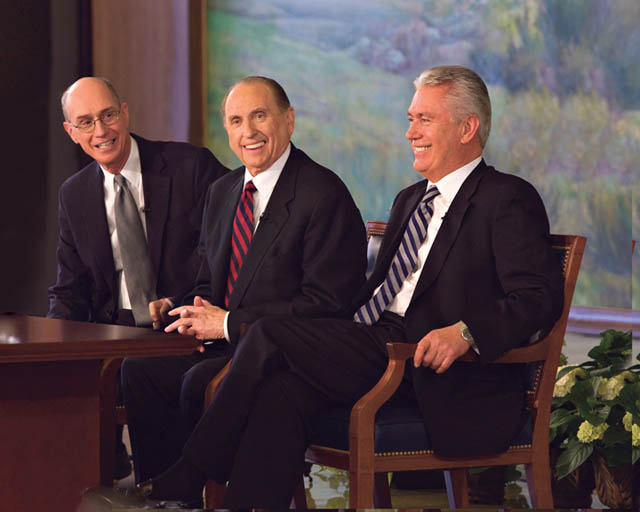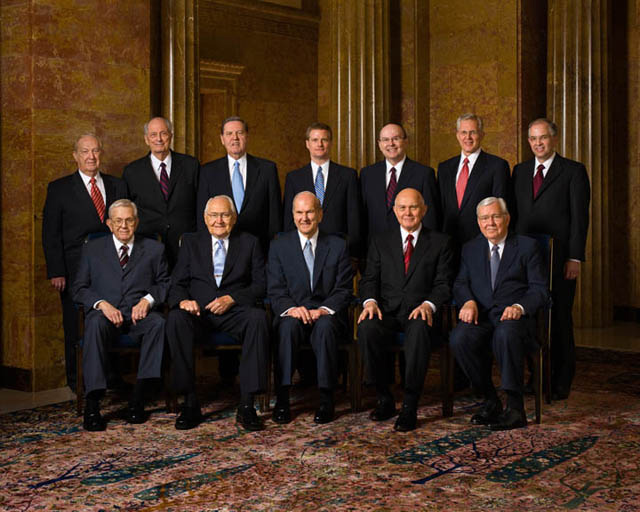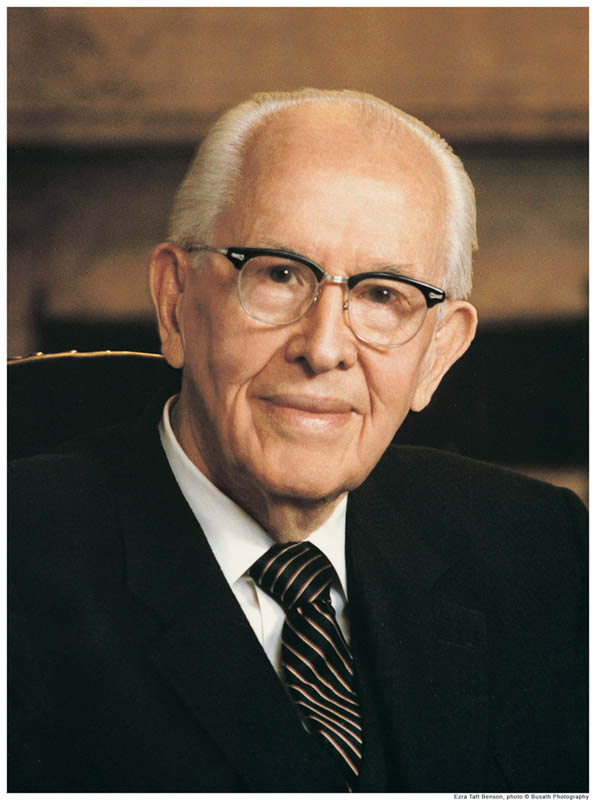This is the eighth installment in a series of articles on Mormon prophets. The series is based on a talk given by Ezra Taft Benson, who was then a Mormon apostle. In the article, he outlines Fourteen Fundamentals in Following the Prophet.
 In this article, we are combining four points about following a Mormon prophet that often lead to controversy and debate. These points are:
In this article, we are combining four points about following a Mormon prophet that often lead to controversy and debate. These points are:
Ninth: The prophet can receive revelation on any matter—temporal or spiritual.
Tenth: The prophet may well advise on civic matters.
Eleventh: The two groups who have the greatest difficulty in following the prophet are the proud who are learned and the proud who are rich.
Twelfth: The prophet will not necessarily be popular with the world or the worldly.
Ezra Taft Benson told a story of Brigham Young, who was frustrated by complaints that Joseph Smith, the first Mormon prophet, was meddling in temporal affairs. During a meeting, Brigham Young asked people to show him the exact dividing line between spiritual and temporal. Of course, they could not do it. God has said that all things are spiritual to Him. God is interested in everything we do and everything can in one way or another impact our spirituality. Spiritual and temporal things frequently interact. For instance, earning a living is temporal, but how you earn a living can have spiritual impact. If you’re earning it doing something immoral, there will be spiritual consequences. What you do with the money you earn is temporal, but it can also have spiritual implications. Very little of what we do is spiritually neutral.
It’s important to note that prophets don’t invent doctrine. From the beginnings of Old Testament times, their role has always been to teach God’s word, whether or not it made sense to people and whether or not they liked it. If a prophet is only following God’s instructions, then to say he can only preach on certain things is to put limitations on God, a pretty arrogant thing for us to do.
There is Biblical precedence for prophets who advise on spiritual matters. Elder Benson mentioned Isaiah as one example and reminded listeners that God praised Isaiah, meaning that he clearly approved. Frequently the leader of the church was also the prophet, such as when Moses led the people through the wilderness. Man feels a need at times to separate the jobs, but God does not.
Yes, this makes it harder for a prophet to be “popular” but as we study the Old Testament, we note that prophets were seldom popular in their own time. The Biblical prophets we love today weren’t always so loved in their own time. People didn’t listen to Noah, they whined about Moses, and they killed any number of prophets. Jesus Himself was the target of anger and hatred from many because he had the audacity to speak out against all sorts of topics, both secular and spiritual. For this reason, Elder Benson reminded listeners that popularity wasn’t a measure of authority from God. While we are free to live as we choose, a wise parent doesn’t encourage poor choices. Good parents know they must lay down rules for their children in order to give them the best possible chance of living successfully and those rules must have consequences. God, being a perfect parent, will do the same. It is His responsibility to show us how we are supposed to live. Unfortunately, many people prefer a prophet simply affirm their personal choices, making Him a mere puppet of human desires and fashions.
If a prophet simply encourages everyone to keep up with current fashion, there is no real need for a prophet. We could do just as well by following the advice in popular magazines and other media. We could justify ignoring Biblical teachings as not applying to today because they’re out of fashion. However, when we have a modern prophet, he can address current situations in current time, making it harder to tune him out or to say it doesn’t apply. Listeners are forced to actively accept or reject a prophet’s teachings and to accept the eternal consequences of those decisions.
Elder Benson said that the people who have the hardest time following a prophet are the rich and the learned—if they are also proud. Those who are highly educated sometimes confuse knowledge with wisdom and then place their textbooks over their Bible in deciding what is true. They sometimes consider themselves smarter than a prophet who may not have as much education as they do.
Dallin H. Oaks, a current apostle of Jesus Christ, taught:
Other illustrations of how our strengths can become our downfall concern the activity of learning. A desire to know is surely a great strength. A hunger to learn is laudable, but the fruits of learning make a person particularly susceptible to the sin of pride. So do the fruits of other talents and accomplishments, such as in the fields of athletics or the arts. It is easy for the learned and the accomplished to forget their own limitations and their total dependence upon God.
Accomplishments in higher education bring persons much recognition and real feelings of self-sufficiency. But we should remember the Book of Mormon’s frequent cautions not to boast of our own strength or wisdom lest we be left to our own strength or wisdom (see Alma 38:11; Alma 39:2; Hel. 4:13; Hel. 16:15).
Similarly, in referring to “that cunning plan of the evil one,” the prophet Jacob remarked that when persons are “learned,” which means they have knowledge, “they think they are wise,” which means they think they have the capacity for the wise application of knowledge. Persons who think they are wise in this way “hearken not unto the counsel of God, for they set it aside, supposing they know of themselves.” In that circumstance, the prophet said, “their wisdom is foolishness and it profiteth them not. And they shall perish. But to be learned is good if they hearken unto the counsels of God” (2 Ne. 9:28–29). (Dallin H. Oaks, “Our Strengths Can Become Our Downfall,” Ensign, Oct 1994, 11)
When Mormons set out to follow the living prophets, they know they must concentrate on being humble and to be receptive to the promptings of the Holy Spirit. Only by doing this can they know what God wants them to do and to stay on the right path, not getting sidetracked by an excessive focus on secular knowledge, current fashion, or a desire to fit in and be popular.
The late Terrie Lynn Bittner—beloved wife, mother, grandmother, and friend—was the author of two homeschooling books and numerous articles, including several that appeared in Latter-day Saint magazines. She became a member of the Church at the age of 17 and began sharing her faith online in 1992.





